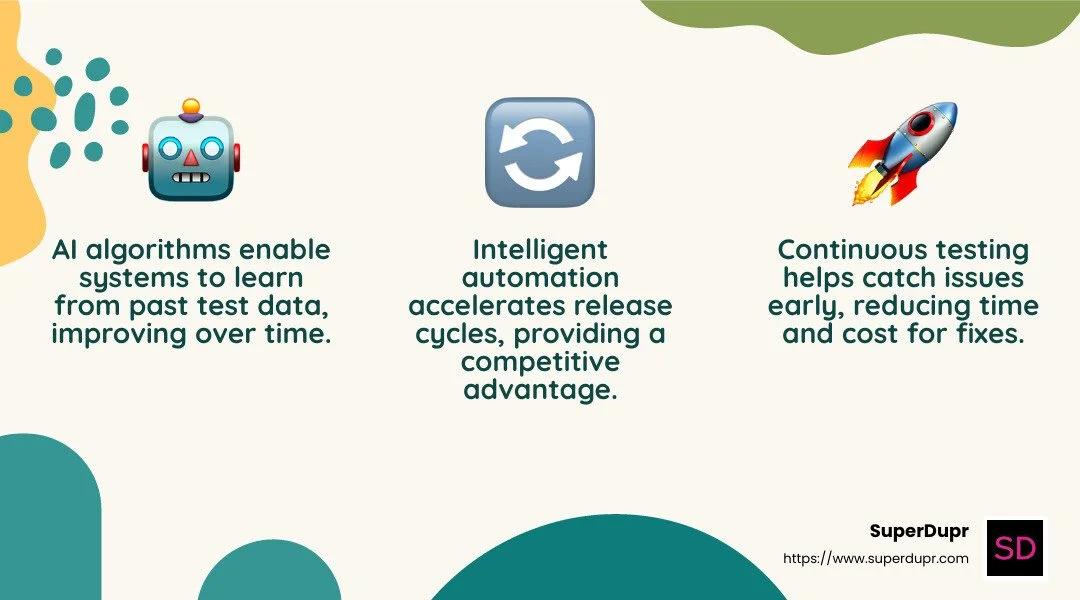Analytics Meets Automation: The Intelligent Testing Revolution
Intelligent test automation and analytics are tools changing the way businesses approach software testing, introducing best efficiency and quality assurance to the development cycle. In the dynamic landscape of software development, integrating AI-driven testing presents a pathway to streamline processes, reduce errors, and deliver high-quality digital products.
Key Highlights of Intelligent Test Automation and Analytics:
AI-Driven Efficiency: Automatically create and execute test cases with minimal human intervention.
Quality Assurance: Leverage predictive analysis to identify and rectify possible defects before they become issues.
Cost-Effectiveness: Reduce maintenance costs and improve resource allocation.
I'm Justin McKelvey, the visionary leader at SuperDupr, with in-depth expertise in intelligent test automation and analytics. I have carefully guided our company to deliver innovative digital solutions, including automation strategies that ensure optimal quality.
What is Intelligent Test Automation and Analytics?
Intelligent test automation and analytics combine advanced technologies like AI algorithms and machine learning to revolutionize software testing. This approach goes beyond traditional methods by incorporating continuous testing into the development process.
AI Algorithms and Machine Learning
At the heart of intelligent test automation are AI algorithms and machine learning. These technologies enable systems to learn from previous test data, adapt to new code changes, and improve over time. This means that tests are not just automated; they are smart, evolving with the software they test.
For example, intelligent test automation tools use AI and natural language processing (NLP) to create test scripts without writing code. This makes it easier for testers to generate and maintain tests, even as applications change.
Continuous Testing
Continuous testing is a crucial component of intelligent test automation. It allows for the ongoing assessment of software throughout the development lifecycle. By testing continuously, teams can catch issues earlier, reducing the time and cost of fixing them later.
Automated testing suites can automate a significant portion of testing activities, from test-case design to results analysis. This ensures that testing keeps pace with development, allowing for faster, more reliable releases.
Real-World Impact
Intelligent test automation and analytics are changing the software industry. They enable faster testing, improved accuracy, and smarter decision-making. By leveraging these technologies, companies can stay competitive, delivering high-quality software quickly and efficiently.
Incorporating AI and machine learning into testing processes not only boosts efficiency but also improves the ability to make data-driven decisions. This leads to accelerated release cycles and a significant competitive advantage in the marketplace.
In the next section, we'll explore the benefits of intelligent test automation in more detail, highlighting how it reduces error rates and improves overall efficiency.
Benefits of Intelligent Test Automation
Reduced Error Rates
One of the standout benefits of intelligent test automation is its ability to slash error rates. By minimizing human involvement, these systems make fewer mistakes. This is crucial because even small errors in software can lead to significant problems down the line. Intelligent systems use machine learning to identify patterns and predict issues, ensuring that the software is as bug-free as possible before it reaches the user.
Improved Efficiency
Efficiency is another major win with intelligent test automation. Traditional testing can be slow and labor-intensive. In contrast, intelligent systems can quickly analyze complex environments and execute tests much faster. For instance, the use of AI-driven tools like Testsigma, which employs natural language processing, allows even non-technical team members to create and maintain tests. This means testing can happen more often and with less effort, keeping projects on track and within budget.
Cost Efficiency
While there might be an upfront investment in intelligent test automation tools, the long-term savings are substantial. These systems reduce the need for manual intervention, cutting down on labor costs. They also decrease the time spent on test maintenance. Over time, this leads to significant cost reductions, allowing businesses to allocate resources more effectively. Intelligent test automation not only saves money but also enables companies to deliver higher-quality software at a faster pace.
These benefits make intelligent test automation an attractive option for businesses looking to improve their software development processes. By reducing errors, boosting efficiency, and cutting costs, companies can release better software more quickly, gaining a competitive edge in the market.
In the next section, we'll dig into the challenges of implementing intelligent test automation and how to overcome them.
Challenges in Implementing Intelligent Test Automation
While intelligent test automation offers numerous benefits, implementing it is not without its problems. Let's explore some of the key challenges teams face when adopting these advanced systems.
Complex Test Creation
Creating tests for intelligent automation can be daunting. These systems often require high technical expertise, especially in AI and machine learning. Testers must learn new languages and frameworks, which can be time-consuming and resource-intensive. Setting up the necessary infrastructure to support these tools can also be complex, especially for teams just starting out. According to Rejin Chandran, a seasoned expert in quality testing, the transition to intelligent systems is part of what he calls "software testing 3.0." This evolution demands a new skill set and mindset from testers.
Reporting Noise
Another challenge is dealing with reporting noise, such as false positives and false negatives. AI-based test automation may sometimes flag issues that don't exist or miss actual problems. This noise can make it difficult for teams to trust the results, leading to unnecessary rework or overlooked bugs. Handling this noise requires fine-tuning the AI algorithms and ensuring the test data sets are comprehensive and well-curated.
Trust in Automation
Building trust in automation is essential but challenging. Many teams are hesitant to rely entirely on automated systems, fearing they might miss crucial errors or fail to adapt to changes. Long-running scripts can cause performance issues, affecting overall network performance and user experience. As reported by SD Times, a significant number of organizations still rely heavily on manual testing, partly due to concerns about automation accuracy. To overcome this, teams need to ensure robust integration with existing systems and maintain continuous monitoring and improvement of automated tests.
Addressing these challenges requires careful planning and a strategic approach. By investing in training, fine-tuning AI models, and fostering a culture of trust in automation, teams can effectively harness the power of intelligent test automation. In the next section, we will explore the top reasons to adopt intelligent test automation and how it can transform your testing processes.
Top Reasons to Adopt Intelligent Test Automation
Adopting intelligent test automation can be a game-changer for your team. Let's explore the top reasons why this approach is gaining traction.
Boosted Efficiency
One of the most compelling reasons to accept intelligent test automation is the significant boost in efficiency. By automating repetitive and time-consuming tasks, teams can execute more tests in less time. This frees up human testers to focus on complex tasks that require creativity and critical thinking. According to research, this efficiency not only speeds up development cycles but also improves team morale by reducing mundane workloads.
Data-Driven Insights
Intelligent test automation leverages advanced analytics to provide data-driven insights. These insights help teams make informed decisions by identifying patterns and trends in testing data. With clear and actionable insights, teams can strategize better and prioritize tasks more effectively. This capability is particularly valuable in today’s development environments, where data-driven decision-making is crucial for success.
Accelerated Release Cycles
The pressure to release updates and new features quickly is ever-present. Intelligent automation accelerates release cycles by replacing slow, manual processes with fast, automated ones. By providing quicker feedback loops, developers can address issues and iterate faster. This results in a significantly reduced time to market, which is a competitive advantage in any industry.
Incorporating intelligent test automation into your workflow can transform how your team operates. By boosting efficiency, offering data-driven insights, and accelerating release cycles, this approach positions your team for success in a rapidly evolving tech landscape. Let's address some frequently asked questions about intelligent test automation and analytics.
Frequently Asked Questions about Intelligent Test Automation and Analytics
What is intelligent automation testing?
Intelligent automation testing is a modern approach to software testing that uses advanced technologies like machine learning (ML) and natural language processing (NLP). These technologies help automate the creation and execution of test scripts, making the process smarter and more efficient.
Machine learning enables the system to learn from past tests and adapt to changes in the software. This means the tests can evolve over time without needing constant manual updates. NLP allows testers to create test scenarios using natural language, making it easier for those who aren't coding experts.
How does intelligent test automation differ from traditional automation?
Traditional test automation often relies on static scripts that need to be manually updated whenever there's a change in the application. This can be time-consuming and requires technical expertise.
Intelligent test automation is different because it uses AI-driven, adaptive scripts. These scripts can adjust automatically to changes in the software, reducing the need for manual updates. By leveraging AI, intelligent automation can understand the context and make decisions during testing, which traditional automation cannot do.
This adaptability leads to more reliable testing and less maintenance work, allowing teams to focus on more strategic tasks.
What are the benefits of using AI in test automation?
Using AI in test automation offers several significant benefits:
Faster Testing: AI can automate repetitive tasks and run tests much quicker than humans, speeding up the entire testing process.
Improved Accuracy: AI-driven systems minimize human error, ensuring more accurate test results. They can also detect issues that might be missed by manual testing.
Predictive Insights: AI can analyze historical data to predict potential defects, allowing teams to address issues before they become problems.
Cost Efficiency: While there might be an initial investment in AI tools, the long-term savings are substantial due to reduced manual work and maintenance.
These benefits make AI a powerful tool in software testing, helping teams deliver high-quality products faster and more efficiently.
As we continue to explore intelligent test automation and analytics, understanding these FAQs can provide a solid foundation for embracing this innovative approach.
Conclusion
At SuperDupr, we believe that intelligent test automation and analytics are not just about keeping up with technology; they are about strategic planning and improving software quality. As a company that thrives on innovation, we are committed to helping businesses scale efficiently through AI-driven solutions.
Strategic Planning with Intelligent Automation
Integrating intelligent test automation into your business strategy can revolutionize your development process. By automating repetitive tasks and using AI to adapt to software changes, you can focus on what truly matters—innovation and growth. Our expertise in AI and automation allows us to craft solutions that align with your business goals, ensuring a seamless transition from manual to automated testing.
Improving Software Quality
Quality is at the heart of what we do. Intelligent test automation not only speeds up the testing process but also improves accuracy and reliability. By reducing human error and providing predictive insights, our solutions help you deliver robust software that meets the highest standards. This means fewer bugs, happier customers, and a stronger reputation in the market.
Partner with SuperDupr
With our strategic approach and commitment to excellence, we are uniquely positioned to guide you through the intelligent testing revolution. Our services are designed to save you time and money, enabling you to launch products faster and more effectively.
Explore how our services can transform your business and set you on the path to success.
When technology evolves rapidly, staying ahead means embracing change. With SuperDupr by your side, you can confidently steer the future of software testing and achieve new heights in quality and efficiency.



